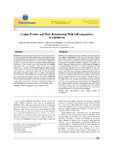Coping profiles and their relationship with self-compassion in childhood

Use este enlace para citar
http://hdl.handle.net/2183/35036Colecciones
- Investigación (FEDU) [938]
Metadatos
Mostrar el registro completo del ítemTítulo
Coping profiles and their relationship with self-compassion in childhoodTítulo(s) alternativo(s)
Perfiles de afrontamiento del estrés y su relación con la autocompasión en la infanciaAutor(es)
Fecha
2022-01Cita bibliográfica
Ferradás, M. M., Freire, C., Prada, L., Núñez, J. C., & Rodríguez, S. (2022). Coping profiles and their relationship with self-compassion in childhood. Psicothema, 34(1), 41-48. DOI: 10.7334/psicothema2021.269
Referenciado por
Perfiles de afrontamiento del estrés y su relación con la autocompasión en la infancia
Resumen
[Abstract] Introduction: In line with the growing attention to mental health and stress in children, the present study analyzed the existence of differentiated profiles of coping in response to everyday stressors. The study also examined whether the identified profiles differed in levels of self-compassion. Method: 487 children (9 - 12 years old), selected by convenience sampling, participated in the study. A cross-sectional, ex post facto design was used. Results: Four coping profiles were identified: a profile with low use of coping strategies (LCP), a profile with predominantly approach coping strategies (ACP), a profile with high use of all coping strategies (HMP) and a profile with moderate use of all strategies (MMP). The ACP and HMP profiles demonstrated significantly higher levels of positive self-compassion, whereas the HMP, LCP and MMP profiles demonstrated significantly higher levels of negative self-compassion than the ACP profile. Conclusions: These findings make it possible to determine the profiles of children who are more and less functional in terms of their psychological resources for coping with day-to-day stress. This may encourage the development of more individualized interventions in order to prevent childhood stress. [Resumen] Antecedentes: en línea con la creciente atención hacia la salud mental y el estrés en la población infantil, en el presente estudio se analizó la existencia de perfiles diferenciados de afrontamiento del estrés en respuesta a las demandas cotidianas. Asimismo, se determinó si los perfiles identificados diferían en su nivel de autocompasión. Método: en el estudio participaron 487 niños (9 - 12 años), seleccionados mediante un muestreo por conveniencia. Se llevó a cabo un diseño ex post facto transversal. Resultados: se identificaron cuatro perfiles de afrontamiento: perfil con baja utilización de estrategias de afrontamiento (PBA), perfil con predominio de estrategias aproximativas (PAA), perfil con alta utilización de todas las estrategias (PAAM) y perfil con una utilización moderada de todas las estrategias (PMAM). El PAA y el PAAM evidenciaron los niveles significativamente más altos de autocompasión positiva. Asimismo, los perfiles PAAM, BA y PMAM mostraron niveles significativamente más altos de autocompasión negativa que el perfil PAA. Conclusiones: estos hallazgos permiten determinar los perfiles de niños más y menos funcionales en cuanto a sus recursos psicológicos para hacer frente al estrés cotidiano infantil. Ello favorecería el desarrollo de intervenciones más individualizadas en la prevención del estrés infantil.
Palabras clave
Childhood
Coping profiles
Self-compassion
Stress
Infancia
Perfiles de afrontamiento
Autocompasión
Estrés
Coping profiles
Self-compassion
Stress
Infancia
Perfiles de afrontamiento
Autocompasión
Estrés
Versión del editor
Derechos
Atribución (CC BY)
ISSN
0214 - 9915






